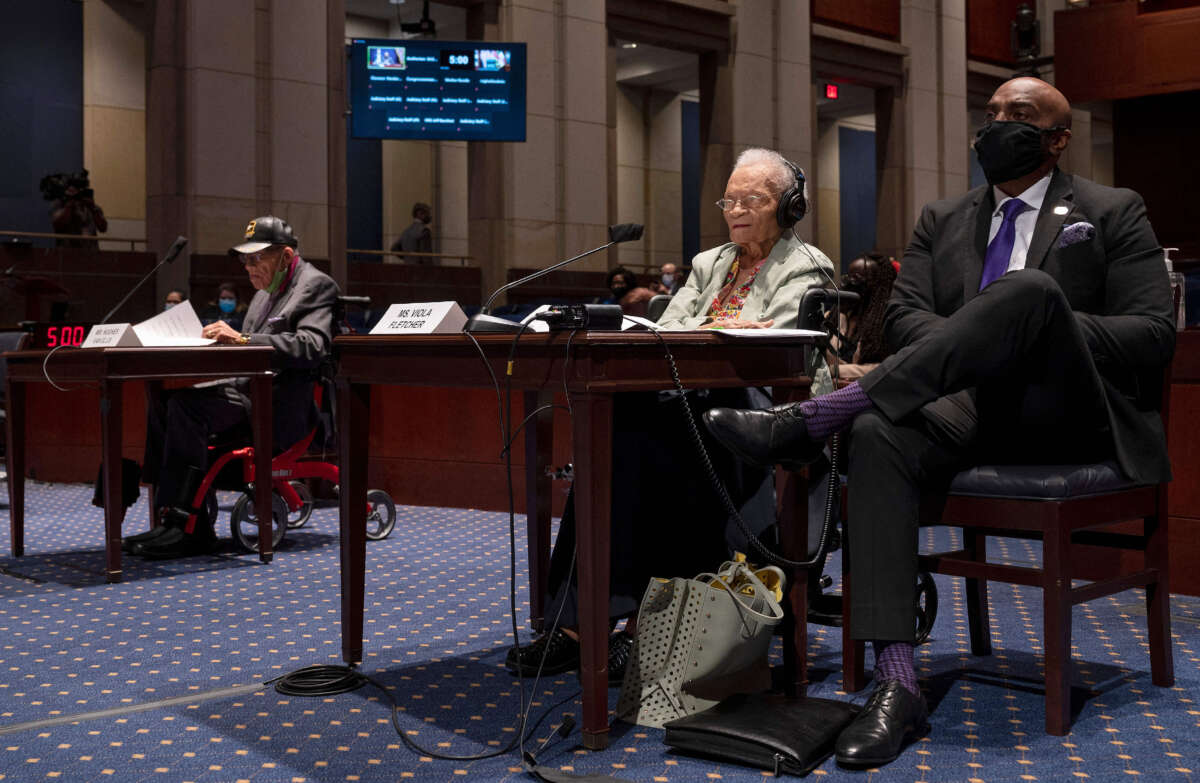Support justice-driven, accurate and transparent news — make a quick donation to Truthout today!
Oklahoma State Superintendent of Public Instruction Ryan Walters (R) has suggested that discussion of race shouldn’t be included in lessons on the Tulsa Race Massacre, a white supremacist massacre in which a mob of white people murdered hundreds of Black residents and destroyed thousands of their homes and businesses over a century ago.
The superintendent’s comments came on the same weekend that a judge in Tulsa County dismissed a lawsuit from survivors of the attack who were seeking compensation from the city over its inaction in stopping the mob in 1921.
During a speaking engagement on Thursday in Norman, Oklahoma, Walters claimed that teachers shouldn’t delve into the topic of race during lessons on the Tulsa Race Massacre, one of the worst incidents of racial violence in U.S. history.
In response to a question about the massacre, Walters claimed that students shouldn’t be taught that they are “inherently racist” because they are the same race as past aggressors — despite the fact that students aren’t actually being taught this in classrooms.
“To say it was inherent in that because of their skin is where I say, ‘That’s critical race theory,'” Walters said. “You’re saying that a race defines a person, I reject that.”
Critical race theory is a set of college-level legal theories that examine how systemic racism and inequality are shaped by laws and legal precedents. Notably, the teachings of critical race theory do not include the assertion that some people are inherently racist.
Walters went on to say that a person examining historical atrocities should “be judgmental of the issue, of the action, of the content, of the character, of the individual, absolutely.” He then rejected that such lessons should include examinations of racism. “Let’s not tie to his skin color and say the skin color determined” a person’s actions, he said.
Video of Walters’s comments went viral on social media, leading many observers to condemn him for downplaying the role of race in the Tulsa Race Massacre. Walters later accused the media of “misrepresenting” his statements to create a “fake controversy.”
But although Walters said that “the events on that day were racist, evil, and it is inexcusable,” he continued to exploit the topic of the massacre to push cynical right-wing talking points about critical race theory.
“Kids should never be made to feel bad or told they are inferior based on the color of their skin,” Walters said, presumably referring to white children in history classrooms where discussions are had about racism.
Walters’s explanation was met with widespread outrage.
“How are you going to talk about a race massacre as if race isn’t part of the very cause of the incident?” Alicia Andrews, the chair of the Oklahoma Democratic Party, told The Guardian.
“As a Black woman who lives in Tulsa, those remarks hit particularly hard and close to home,” she added.
“Absolutely the race massacre is tied to race, that’s why it’s called the Tulsa Race Massacre, state Rep. Regina Goodwin (D) told MSNBC. “Racist white mobs came in and murdered Black folks.”
During the massacre, which took place in an affluent Black neighborhood in Tulsa, Oklahoma, in 1921, a mob of white people attacked people, homes and businesses in one of the deadliest racially motivated attacks in U.S. history. The mob is believed to have killed around 300 people.
As Walters’s words were going viral, an Oklahoma state judge rejected a lawsuit from a group of survivors of the massacre, who sought reparations from the city over inaction from officials as the attacks were taking place.
Tulsa County District Court Judge Caroline Wall dismissed a lawsuit from victims of the massacre on Friday, with prejudice, meaning that they cannot file another lawsuit seeking different forms of reparations in the future. The lawsuit from three individuals who lived through the event — Lessie Benningfield Randle, 108, Viola Fletcher, 109, and Hughes Van Ellis, 102 — alleged that the city of Tulsa failed to stop the white mob from attacking Black people and their neighborhood, essentially breaking public nuisance laws in the process.
The suit had sought to have the city provide a detailed account of all the wealth and property that had been lost or stolen during the attack. It also sought the construction of a hospital in north Tulsa, and the creation of a Tulsa Massacre Victims Compensation Fund.
Attorneys for the survivors of the attack said they would appeal the ruling.
“Black Americans, especially Black Tulsans, carry the weight of intergenerational racial trauma day in and day out — a weight they cannot relinquish or cavalierly dismiss,” said one of their lawyers, Sara Solfanelli. “The dismissal of this case is just one more example of how America’s, including Tulsa’s, legacy is disproportionately and unjustly borne by the Black community.”
Press freedom is under attack
As Trump cracks down on political speech, independent media is increasingly necessary.
Truthout produces reporting you won’t see in the mainstream: journalism from the frontlines of global conflict, interviews with grassroots movement leaders, high-quality legal analysis and more.
Our work is possible thanks to reader support. Help Truthout catalyze change and social justice — make a tax-deductible monthly or one-time donation today.
